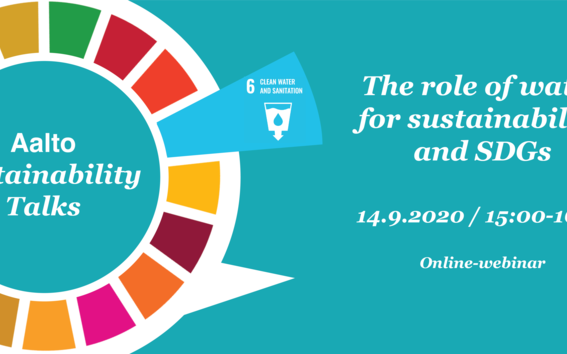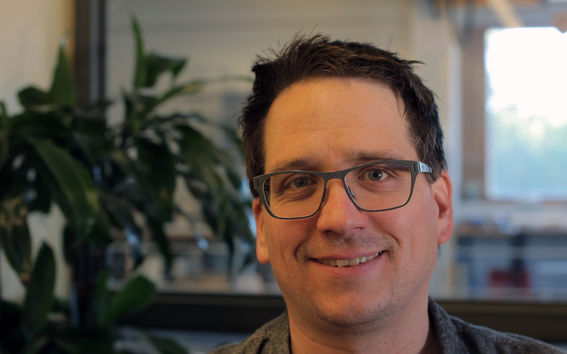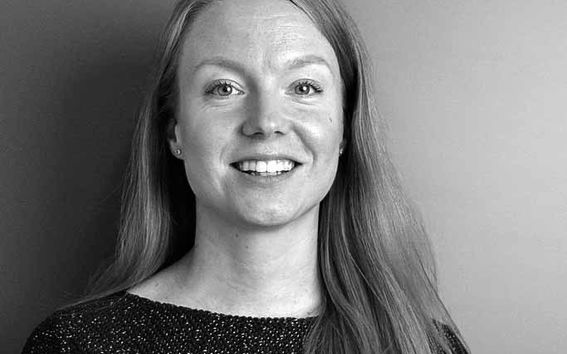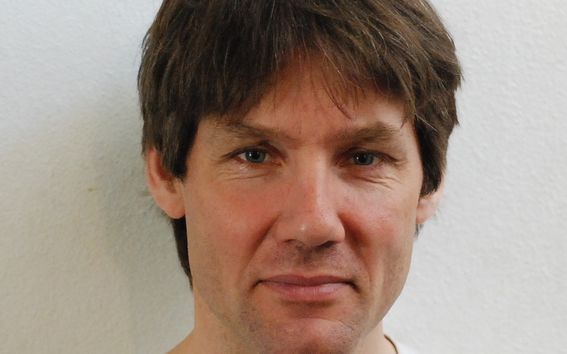Recording: The role of water for sustainability and SDGs (ulkoinen linkki)
Recording of Aalto Sustainability Talks: The role of water for sustainability and SDGs 14.9.2020


Recording of Aalto Sustainability Talks: The role of water for sustainability and SDGs 14.9.2020
Water plays a central role for development and it is a fundament of life on Earth. Water is a key enabler for our well-being as well as for food and energy security. Water has also a critical role for climate change adaptation, as practically all climate-related impacts (except direct consequences from temperature changes) occur due to changes in hydrological cycle. Water can thus also hinder development through e.g. floods, pollution, and increasing water scarcity. As a result, most Sustainable Development Goals i.e. SDGs link to water. The SDGs also include a specific fresh water related Goal # 6. The broad set of targets within SDG 6 address e.g. water and sanitation, efficiency and equity of water use, integrated water resources management, transboundary water cooperation as well as the protection of water-related ecosystems. Yet, sustainability does not require physical availability of water only, but it also links closely to the ways we manage and govern our water resources and related services. An enabling environment with international cooperation, capacity building and participation are critical aspects of good water governance. According to a 2018 UN review report, the global community is currently not on track to achieving the ambitious targets set for SDG 6. The complexity of water related questions with their numerous interconnections to other sustainability dimensions materialize e.g. in trade-offs and unexpected impacts of activities, challenging the global community in achieving sustainable development and climate change adaptation.
Chair: Ossi Naukkarinen, Vice President, Research
Minna Halme, Professor, Director of Aalto Sustainability Hub
Marko Keskinen, Assoc. Professor, Department of Built Environment
Abstract: Water can be seen to crosscut the SDGs: without water, most SDGs would be difficult to achieve or would become pointless. For sustainability to grow and flourish, we must therefore water sustainability. But what kinds of actions this requires, from water field as well as related fields and themes such as food, energy, climate and circular economy? And what kinds of lessons water and other sectors can learn from so called nexus approaches, which emphasise the connections between different sectors - and, hence, of different SDGs.
Maija Taka, Postdoctoral researcher, Department of Built Environment
Abstract: The United Nations Agenda 2030 for Sustainable Development is an ambitious and fundamentally important global-level commitment, and the implementation of policies to support the 17 Sustainable Development Goals (SDGs) is far from a trivial exercise. One under-investigated factor is the interconnectedness of the SDGs; a policy targeting one SDG can influence or be pre-conditioned by others. We performed a literature-review based meta-analysis of the synergies and trade-offs of water security to SDGs and found out that water security positively contributes to all SDGs, with on average of four links to SDGs per paper. The relationship was strongest with good health (SDG3) and zero hunger (SDG2). Negative linkages (totaling to 9%) may have been underreported though. Our approach serves a useful tool for identifying the leverage points in supporting human and environmental livelihoods simultaneously.
Mikko Jalas, Prof. of practice (Sustainable consumption), Department of Design
Abstract: Phosphorus (P) epitomizes the problems of sustainability of the current systems of production and consumption. It is a non-substitutable element of crucial primary production activities, namely agriculture. It is increasingly scarce and subject of geopolitical conflicts. It is used in systems where recovery and reuse are in principle possible, but far from realized. Finally, it also witnesses to the common pattern that sustainability questions cross-link and are both social and ecological. The overdosing of phosphorus, its careless use and miniscule recovery e.g. from wastewaters globally stand for ramping up ecological problems of coastal waters as well as looming resource crises and constrained food production. The presentation will review evidence for above claims, explore alternative P-futures and problematize the notion of resources as a dominating way of framing sustainability.

Marko Keskinen is inspired by water, sustainability and solutions, and believes that research should have both scientific and societal impact. Marko is an Associate Professor on water resources management and policy at Aalto University School of Engineering, and acts also as a Programme Director for Master's Programme in Water and Environmental Engineering.

Maija Taka works as a postdoc in the Water and Environmental Engineering Research Group, focusing on improving doctoral education process. Additionally, she’s interested in sustainability in the context of water resources, especially in urban water and water quality issues.

Mikko Jalas is a professor of practice in Sustainable Consumption at Department of Design at Aalto University. He holds a PhD in Organization and Management and is the head of the Creative Sustainability Master’s Programme. His research covers areas such as energy efficiency and the use of renewable energy in households, sustainable consumption as well as life cycle management and design tools such as carbon footprinting.

Aalto Sustainability Talks -seminaarisarja tuo esiin ajankohtaista kestävän kehityksen tutkimusta ja ratkaisuja tämän hetken kestävyyshaasteisiin.
Read Aalto's privacy notice here.